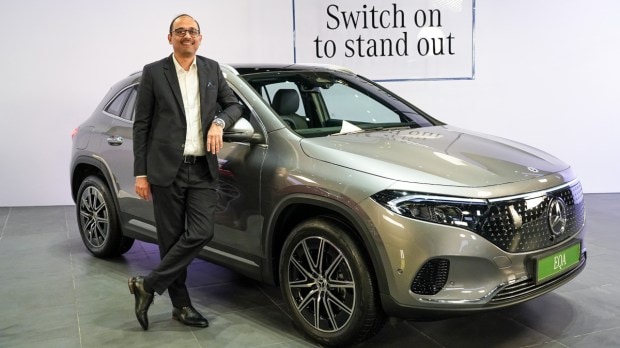India’s leading luxury car manufacturer, Mercedes-Benz, continues to support the government’s sustainability goals as it launched its most affordable electric vehicle (EV), the EQA. In a conversation with Santosh Iyer, the Managing Director and CEO of Mercedes-Benz India, he revealed that the Battery Electric Vehicle (BEV) market has expanded by 60 per cent. This growth is driving the company to introduce two additional EVs, the EQS and the EQG, by the year’s end. Iyer also discussed budget expectations and the primary challenges facing the EV market in India.
Mercedes-Benz: Budget Expectations
Without mincing his words, Iyer believes that the current policies and GST rates need to be sustained for the next 5 to 10 years. “There has to be a statement of intent by the government saying that these policies and GST rates will continue for 5-10 years because only then OEMs can invest significantly more on EVs,” explains Iyer.

A steadfast commitment to the revolutionary 5% GST on electric vehicles, in contrast to the 50% on internal combustion engine vehicles, will aid in achieving the vision of a carbon-neutral ecosystem. Mercedes-Benz is confident that EVs represent the most feasible technology to accomplish this goal. By the end of this year, Mercedes-Benz plans to have at least six electric vehicles in its Indian market lineup. Presently, Mercedes-Benz offers four electric models: the EQS, the EQE, the newly updated EQB, and the 2024 EQA.
Mercedes-Benz: Major EV challenges
Mercedes-Benz gained an early advantage by entering the electric vehicle (EV) sector in 2020, amidst the COVID-19 pandemic. Since then, the company has made significant progress, culminating in the launch of the locally manufactured EQS.
Some argue that Mercedes-Benz was slower than anticipated in joining the luxury compact EV SUV market with the EQA, given that its rivals are already present in this segment. Iyer notes that the EQA is the top-selling EV globally in the Mercedes-Benz lineup, and the aim was to introduce the most recent version of the EQA in India. He added, “EVs are not about numbers or volumes, as they account for 5 per cent of total sales, up from last year’s 2 per cent. The emphasis should be on developing the ecosystem and democratizing the charging infrastructure.” He also pointed out that the perception of EVs needs to evolve and that all stakeholders must collaborate. Ultimately, the objective is to achieve emission-free mobility.
Mercedes-Benz is targeting a younger audience for EVs because they have a better understanding of the ecosystem. Iyer also added. “It is said women also adapt to change faster and we expect the women customers to increase from 8 to 15 per cent, including EV buyers.”





















